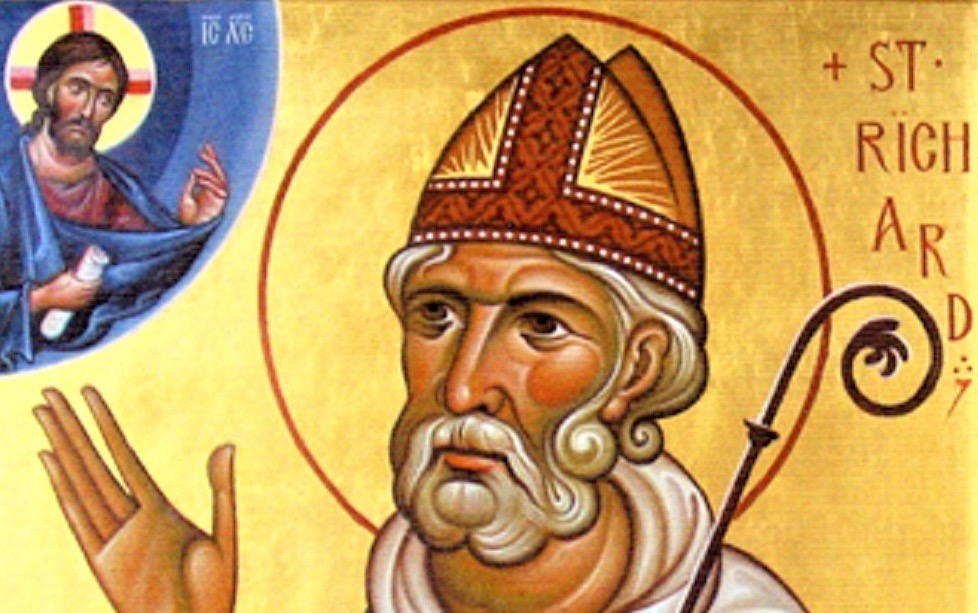
19 Jun St Richard of Chichester
Among the family of the faithful, the Church has always marked out certain individuals for special attention: these are known as the “saints”. They are men and women who have shown their devotion and loyalty to God in both ordinary and extraordinary ways, and who serve as examples of holy living to new Christians in every generation.
To remember them, the Church has allocated each saint a day of the year on which to celebrate their life and witness. For example, the Church remembers St Richard of Chichester on April 3 every year, (although because this usually falls during Lent, the date is often “translated” to June 16). St Richard has a special place in my story, since I was ordained in Chichester cathedral, where he is the patron.
St Richard’s story is an interesting one. When young, he was an avid reader, and decided to go up to Oxford and become a scholar. However, fate had other plans: following the death of his parents, their estate passed into the care of guardians, who squandered what wealth there was and brought the family to the brink of bankruptcy. When Richard’s elder brother inherited the estate, Richard went to work for him as a laborer on the farm. In time, the farm recovered, due in no small part to Richard’s hard work. Richard’s brother offered to make the farm over to Richard, but the offer was declined. Richard had never let go of his dream of becoming a scholar, and he left the farm and headed for Oxford, where he became a student.
Student life was not easy: the diet was poor and on cold winter days students had to interrupt their reading and run around the room to keep warm. Come the summer, students would spend many weeks on vacation, helping to bring in the harvest. This the origin of our long summer vacations.
After Oxford, Richard went to Bologna for seven years to study canon law. Upon his return he was made Chancellor of the University of Oxford, and shortly thereafter appointed Chancellor to Edmund, the Archbishop of Canterbury. Later Richard trained for the ministry and served as a parish priest in the county of Kent. He was then appointed bishop of Chichester in the county of Sussex. This was partly a political appointment: the Archbishop of Canterbury had appointed Richard in order to replace the King’s favorite. In retaliation, King Henry III kept for himself the properties and revenues that rightfully belonged to the bishop’s office. Therefore, Richard began his ministry as bishop without home or income. However, he found food and lodgings in the home of Simon, a poor parish priest who lived in Tarring, Sussex.
In the exercise of his ministry Richard journeyed on foot through the Sussex villages and across the South Downs. He had many deprivations, but never let them become the focus of his life. He said:
“Do you not understand what is written in the Acts of the Apostles; how they rejoiced that they were counted worthy to suffer shame for Christ’s name? I tell you that God of His grace will turn our tribulation to joy”.
When the Pope threatened to excommunicate King Henry III, the King relented and restored the bishop’s property and revenue. Richard remained faithfully serving the people of the Diocese of Chichester until his death in 1253.
I used to keep in my wallet a card with the prayer St Richard wrote:
Thanks be to thee, my Lord Jesus Christ,
for all the benefits thou hast given me,
for all the pains and insults thou hast borne for me.
O most merciful redeemer, friend and brother,
may I know thee more clearly,
love thee more dearly,
and follow thee more nearly, day by day.
Amen.
Recently I was reminded of this prayer after a parishioner suggested I watch the movie “Godspell.” The song, “Day by Day” incorporates this prayer. It amazes me how the simple prayer of thirteenth century bishop should later find popularity in a musical set in New York City. That’s one of the reasons we should remember the saints, because they speak to us across the centuries.
With blessings
Father David




No Comments